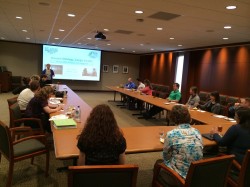Last Thursday, Program Coordinator Olivia Engel presented to food service and sustainability professionals at the annual St. Louis Higher Education Sustainability Consortium (STL-HESC). Her presentation on the GDA and best practices for large-scale dining services was followed by presentations by Fresh Ideas, Sodexo, and Blue Skies Recycling.

Sustainiblity professionals gather for the introduction to the STL-HESC event led by Peggy Lauer, director of Maryville’s sustainbility efforts.
Every spring, the STL-HESC convenes at Maryville University, brought together by the Center for Sustainability at Maryville as well as the Earthways Center of the Missouri Botanical Garden. Each Consortium focuses on a different set of challenges and issues at the educational institution level. This year focused specifically on greening campus dining facilities, and the GDA was invited as the main presenter to offer best practices and strategies to the group.
The GDA’s presentation outlined the certification process and then explored five main takeaways – waste diversion, energy efficiency, cutting disposables, offering vegetarian proteins, and involving the students. In conclusion, Engel stressed that above all, student involvement is essential to campus dining greening. In addition to bringing creative energy and ideas to the table, students also need guidance to understand the complexity of food, the environment, and nutrition.

Engel – pictured here at GDA-certified Kakao Chocolate – drew on her own experiences in college dining halls to emphasize the need for food-based education
“We send kids to school not only to learn but to be looked after,” Engel said. “Campus dining has a huge impact on their health and worldview – by reaching out with education, or just as much by omission. If we feed kids but give them no context, we teach them that food is simple and that it comes from kitchens – and it’s anything but.”
She went on to state that engaging students in the greening process was one of the biggest opportunities available to food service providers. “They’re your students, too.”
The GDA’s presentation was followed by Fresh Ideas, the company behind Maryville’s 4-star certified cafeteria. In 2013, Marvyille and Fresh Ideas were the first university-level cafeteria to achieve GDA certification. Fresh Ideas offered their experiences and feedback on the certification process, and the ways in which it helped them overcome barriers and challenges.
After Fresh Ideas, the distribution and food service company Sodexo presented to the group. Sodexo, which supplies St. Louis University as well as thousands of schools in 80 countries, outlined its sustainability achievements and strategies, particularly showcasing how the economy of scale can work on the side of sustainability if the company takes the right steps. Sodexo sources Fair Trade/Rainforest Alliance-certified products, and students are empowered and engaged at each school. Read more about Sodexo’s social and environmental sustainability practices here.
To tie together the presenters’ points with reference to infrastructural tangibility, Harry Cohen of Blue Skies Recycling discussed the considerations food service providers must take when implementing recycling and composting. He stressed that compliance is hinged a sustainability champion’s presence in the kitchen, at the trash cans, or in the dining hall; waste diversion rates will reflect direct involvement of person-to-person engagement. Sustainability Coordinator at Washington University Mary Ostafi chimed in, reporting that having students stationed at waste stations on campus creates a skyrocketed diversion rate.
This year’s Consortium saw representatives from SLU, WashU, SIUE, UMSL, the Kirkwood and Parkway school districts, USGBC, several food service companies like Fresh Ideas and Sodexo, and more. All parties left with tactics and information to implement a greener food service at their respective schools. If you are engaged in sustainability at the educational level and are interested in joining the Consortium’s mailing list, please contact Katherine.Golden@mobot.org.



